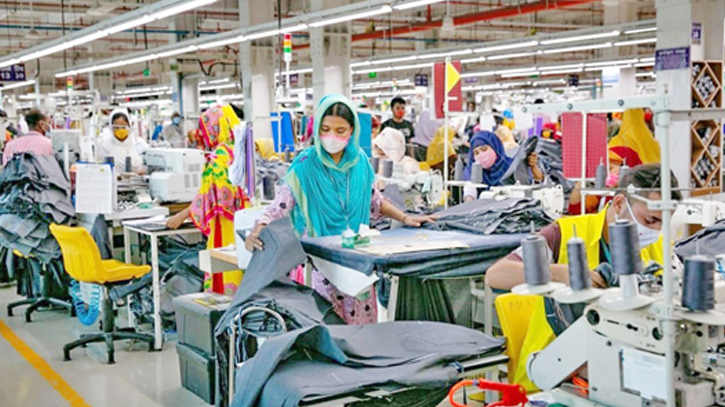
Photo : Collected
A major disruption has struck the Ashulia industrial area in Savar, Dhaka, where 219 ready-made garment (RMG) factories have ceased production due to escalating labor unrest.
This significant upheaval has severely impacted Bangladesh’s export sector, which heavily relies on garment production. The labor disputes, fueled by demands for better wages and working conditions, have led to widespread factory closures, causing substantial losses and delays in shipments. The situation is causing ripple effects throughout the country’s economy, highlighting the urgent need for resolution to stabilize the sector.
Of these, 86 factories have been officially closed by authorities under Section 13(1) of the Labor Act, while the remaining 133 have been given a general holiday.
Sarwar Alam, Superintendent of Police for Ashulia Industrial Police-1, reported that there were no incidents of violence or road blockades in the industrial area on Thursday, September 12. Despite this, the situation remains tense. Some factories have been experiencing internal labor dissatisfaction for several days, with workers refusing to return to work. This morning, production came to a halt across all 219 factories after workers staged strikes and protests, demanding better working conditions and fair wages.
The closed factories include notable names such as Virtual Bottoms, Mandal Knitwears Limited, Sigma Fashions Limited, Ha-Meem Group, Crosswear Industries Limited, and many others.
According to Fazle Ehsan Shamim, Vice President of the Bangladesh Knitwear Manufacturers and Exporters Association (BKMEA), the ongoing unrest is severely impacting the country's export sector. "The country's image is suffering," Shamim told the Daily Messenger.
"Buyers are turning to other countries like India and Sri Lanka due to overpricing and a lack of confidence in our industry."
The unrest has also been exacerbated by wage disputes. Workers have been protesting for over ten consecutive days, both inside and outside their factories. In many cases, factory owners have either failed to meet the workers' demands or have provided false assurances. This has intensified worker frustration, particularly as some factories have not paid salaries for the past month.
The situation has become increasingly complex. Several factories that had declared indefinite closures on Wednesday continued to issue general leave notices on Thursday. Many workers arriving at factories found notices of indefinite closure posted on the gates, adding to their frustration.
Khairul Mamun Mintu, Legal Affairs Secretary of the Bangladesh Garments and Sweaters Workers Trade Union, noted that the number of closures has risen significantly, further fueling worker dissatisfaction.
"There is a growing divide between workers and owners," Khairul Mamun said. "The lack of effective dialogue is prolonging the labor unrest."
Despite the police and military efforts to maintain order, including regular patrols and monitoring, the situation remains volatile. Reports indicate that several other companies, including Gazi, Medina, Kazi, and Pran RFL, have been affected by violence and looting, with staff safety compromised. The extended unrest could have broader implications, potentially impacting the country's foreign exchange reserves and import of daily commodities.
The economic repercussions are already being felt. Data from the Export Promotion Bureau (EPB) shows that the ready-made garment sector, a key contributor to Bangladesh's export earnings, saw a modest 2.86% year-on-year increase during the July-May period of FY24, reaching $43.85 billion.
However, home textile exports experienced a significant decline of 24.29%, falling to $776.06 million from $1.02 billion in the same period of the previous fiscal year.
The country’s foreign reserves also show a concerning trend. Reserves peaked at $32.22 billion in January, but had dwindled to $30.96 billion by April. The ongoing labor disputes could further strain these reserves, potentially affecting the import of essential goods and exacerbating the current dollar crisis.
As the labor unrest continues, both the industry and the workers face an uncertain future. The resolution of these disputes and the restoration of stability are critical not only for the garment sector but for the broader economic health of Bangladesh. The coming days will be crucial in determining the path forward for both workers and factory owners in this turbulent period.
Messenger/Fameema








